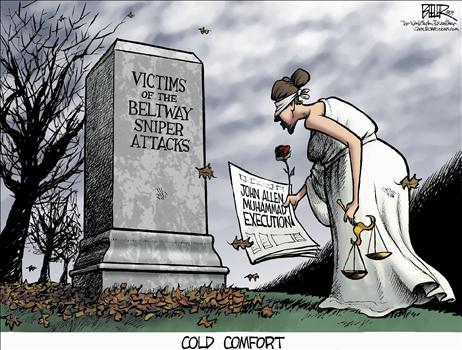And from each man, too, I will demand an accounting for the life of his fellow man. Whoever sheds the blood of man, by man shall his blood be shed; for in the image of God has God made man. [Genesis 9:5-6]
In October of 2002, Washington, DC, and its suburbs were targets of terror. I know. I lived there. For three weeks, everyone wondered if stopping to pump gas in your car would be the last thing you did in this life. Someone was killing innocent people, at least ten during those few weeks.
That someone turned out to be John Allen Muhammad and his accomplice, a teenager named Lee Malvo. That teenager, who is no longer in his teens, is serving a life sentence. Muhammad, on Tuesday evening, was executed by the state of Virginia.
Up to the last, he was sullen and unresponsive, saying nothing. Like last week’s slayer, Nidal Hasan, he was a radical Muslim, although, just like with Hasan, there was an attempt to downplay that truth.
When Muhammad received his penalty, it was a righteous judgment. The reason the Scriptures give for allowing the death penalty is that when you take the life of an innocent person, you have taken the most precious gift God has given to each individual. You have destroyed a being made in the very image of God. The punishment must match the magnitude of the crime.
While in some ways this is a cold comfort, it was necessary to uphold the sanctity of human life. The cold-blooded nature of Muhammad’s crimes are not morally equivalent with a state execution. The first is murder; the second is justice for the murder. It is Biblically mandated. All too often we don’t see true Biblical justice for heinous acts. At least in this case, we did.
Whenever God’s righteousness is honored, society is better for it. Our society is better without John Allen Muhammad. May his just execution serve notice on others who may want to follow in his footsteps.


